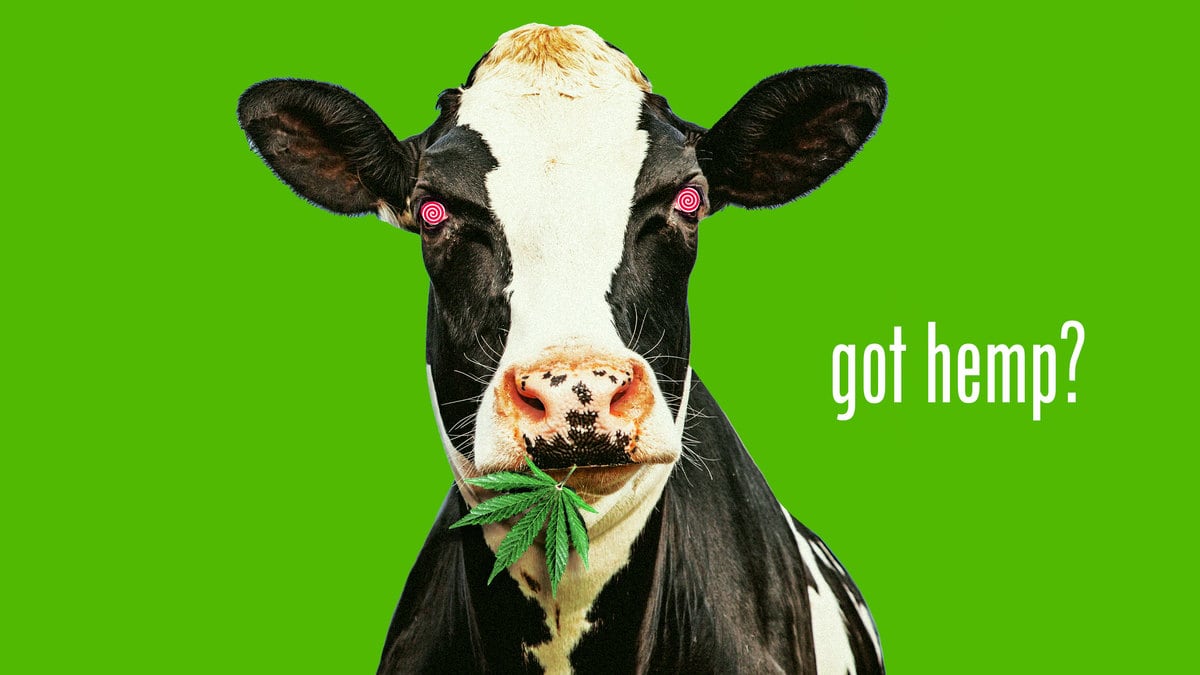Amid moral panic over the legalization of weed, we might be missing a much greater danger posed by the cannabis plant: stoned cows. According to new research from research institutes in Germany, feeding dairy cows hemp may cause changes in the animals’ behavior and unintentionally produce cannabinoid-infused milk.
The study, which was published on Monday in the journal Nature Food, adds data to a growing chorus of voices calling for the brakes to be applied to the hemp feedstock industry. The authors of this study advocate for more research in order to show that hemp is truly as innocuous as it seems.
Hemp, it should be noted, is legal to produce and process. In the U.S., the 2018 Farm Bill legalized growing industrial hemp to turn into cloth, CBD, seed, and grain for human or animal consumption. When processors extract CBD oil from hemp, large amounts of plant material are left behind, prompting growers to consider using it as a cheap animal feed option.
In the study, researchers fed 10 dairy cows different concentrations and types of hemp. One group dined on low-cannabinoid whole-plant hemp, while another received a high-cannabinoid feed made from hemp leaves, flowers, and seeds. Whole-plant hemp at a low concentration did not result in any pronounced changes, but feeding cows even small amounts of the leaves, flowers, and seeds caused the animals to act… well, stoned.
Researchers observed changes like increased yawning, salivating, runny noses, sleepiness, and “pronounced tongue play,” according to the study. Some of the cows given the highest amount of the high-cannabinoid feed even displayed a wobbly gait and abnormal posture.
And the animals that were fed both high and low levels of leaves, flowers, and seeds had measurable amounts of both THC and CBD in their milk, which remained above zero for days after they were weaned from the hemp diet.
Sonja Schäche, a spokesperson for the German Federal Institute for Risk Assessment, told The Daily Beast in an email that the researchers tried to conduct the study as close to a realistic scenario as possible. The THC concentration of the highest levels of hemp fed to the cows was under the legal limit of 0.2 percent, she said.
“The study does not allow any conclusions to be drawn as to whether there is a health risk from the consumption of milk on the market” if it has trace levels of CBD or THC in it, she added.
The study isn’t likely to calm the concerns of critics—and for good reason. The American Veterinary Medical Association warned against using hemp in animal feed earlier this year “until studies show it’s safe.” Not only are the long-term effects to animals of cannabinoid exposure unclear, laboratory methods to detect it in animals’ eggs, milk, and meat are still under development.
“To achieve approval, scientific evidence of appropriate limits needs to be established to protect consumers from unwanted exposure to cannabinoids,” a joint open letter signed by 17 animal organizations reads. “We understand the importance of supporting the hemp industry, and yet we also believe it is simply too soon to know whether hemp is safe for farm and ranch animals, as well as for our pets.”







